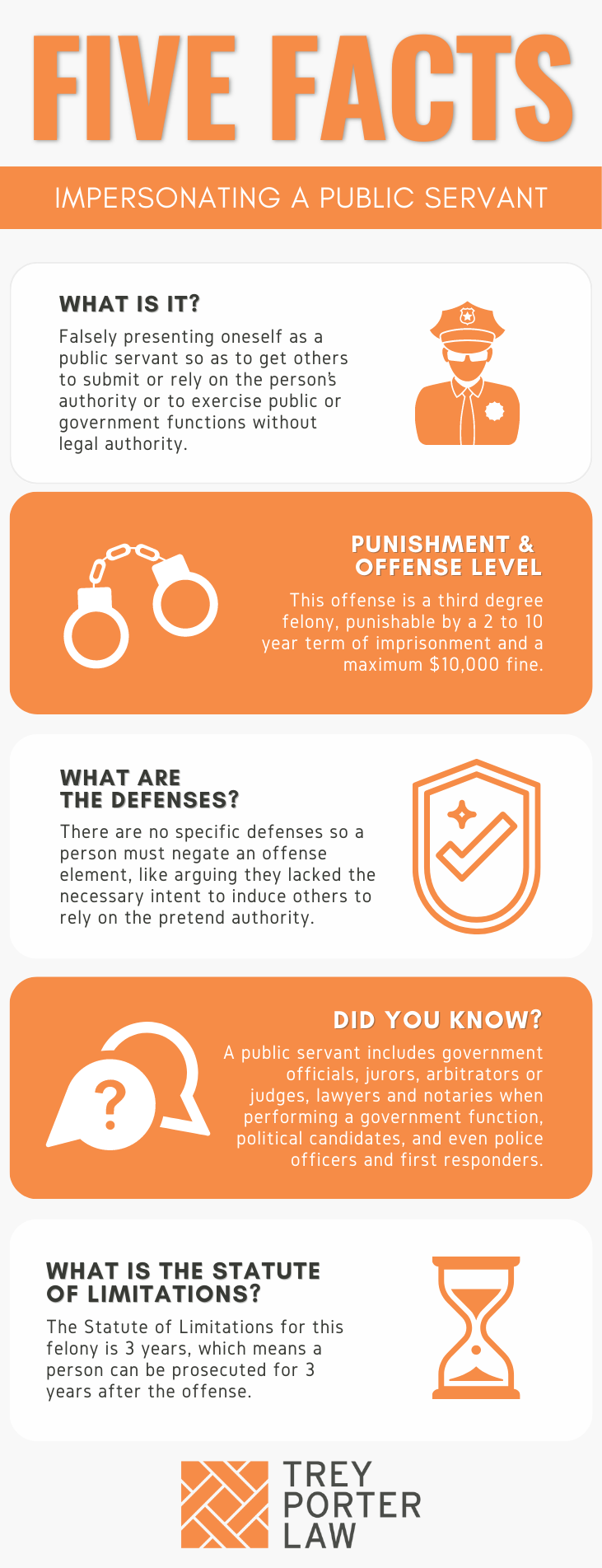WHAT IS IMPERSONATING PUBLIC SERVANT IN TEXAS?
The Texas law against impersonating a public servant prohibits falsely holding oneself out as a public servant with the intent to induce others to submit to or rely upon the pretend official authority, or to exercise a public or government function without legal authority.
- What is a public servant? Texas Penal Code Section 1.07(41) defines a public servant as a person elected, selected, appointed, employed, or otherwise designated as one of the following, even if he has not yet qualified for office or assumed his duties:
(1) an officer, employee, or agent of government;
(2) a juror or grand juror;
(3) an arbitrator, referee, or other person who is authorized by law or private written agreement to hear or determine a cause or controversy;
(4) an attorney at law or notary public when participating in the performance of a governmental function;
(5) a candidate for nomination or election to public office;
(6) a person who is performing a governmental function under a claim of right although he is not legally qualified to do so.
Public servants include anyone performing a governmental function, such as an elected official, police officer, other first responder, juror, or appointed government attorney.
WHAT IS THE IMPERSONATING PUBLIC SERVANT LAW IN TEXAS?
Tex. Penal Code § 37.11. IMPERSONATING PUBLIC SERVANT.
(a) A person commits an offense if the person:
(1) impersonates a public servant with intent to induce another to submit to the person’s pretended official authority or to rely on the person’s pretended official acts; or
(2) knowingly purports to exercise, without legal authority, any function of a public servant or of a public office, including that of a judge and court.
(b) An offense under this section is a felony of the third degree.
WHAT IS THE PENALTY CLASS FOR IMPERSONATING PUBLIC SERVANT IN TEXAS?
Impersonating a public servant is a third degree felony, punishable by two to ten years in prison.
WHAT IS THE PUNISHMENT RANGE FOR IMPERSONATING PUBLIC SERVANT IN TEXAS?
A person charged with impersonating a public servant faces between two and ten years in prison, and a maximum $10,000 fine.
WHAT ARE THE PENALTIES FOR IMPERSONATING PUBLIC SERVANT IN TEXAS?
A person charged with impersonating a public servant may be eligible for probation after a conviction, or deferred adjudication without a conviction, for a maximum period of ten years.
WHAT ARE THE DEFENSES TO IMPERSONATING PUBLIC SERVANT IN TEXAS?
A person may not be convicted of impersonating a public servant unless the prosecution proves the person intended to influence another by exercise of his pretend official authority. An accused may therefore defend against a public servant impersonation charge by arguing he did not have the requisite specific intent to induce others to submit or rely on his authority.
- What does it mean to induce another to submit to or rely on the person’s pretended official acts or authority? No overt act in addition to falsely holding oneself out as a public servant is required to sustain a conviction. The intent to induce submission or reliance may be inferred by the circumstances.
WHAT IS THE STATUTE OF LIMITATIONS FOR IMPERSONATING PUBLIC SERVANT IN TEXAS?
The limitation period for impersonating a public servant, a third degree felony, is three years.
IMPERSONATING PUBLIC SERVANT IN TEXAS
To be convicted of impersonating a public servant, the State must show the accused falsely held himself out to be a public servant, and intended to induce another to submit to or rely on his pretend official authority.
TEXAS IMPERSONATING PUBLIC SERVANT COURT CASES
The case law regarding impersonating a public servant in Texas
- In Cornwell v. State, the defendant was convicted of impersonating a public servant after pretending to be an assistant district attorney from another county. He spoke to a prosecutor several times about his friend’s case, and fabricated professional accomplishments to gain credibility, and requested a personal favor on his friend’s behalf. The appellate court affirmed, and explained this was more than merely identifying himself as a public servant.













